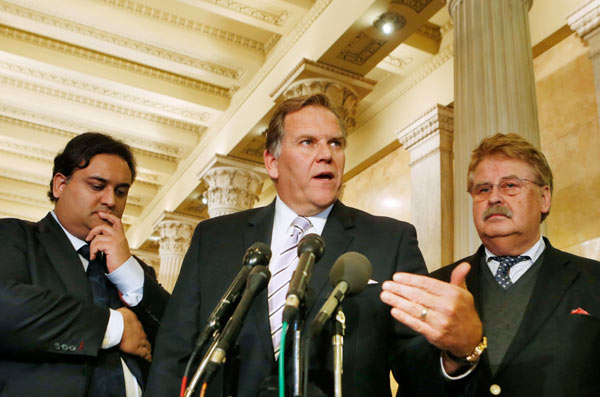US spying prompts reversal by anti-terror lawmaker
Updated: 2013-10-29 23:09
(Agencies)
|
|||||||||||
 |
|
Chairman of the House Permanent Select Committee on Intelligence US Rep. Mike Rogers (R-MI) (C) speaks next to European Parliament leader of the Civil Liberties Committee Inquiry Claude Moraes (L) and German Member of the European Parliament and the current Chairman of the European Parliament Committee on Foreign Affairs Elmar Brok (R) about a closed door meeting on NSA surveillance on US allies while on Capitol Hill in Washington, October 28, 2013. [Photo/Agencies] |
WASHINGTON — He gave more surveillance power to US government spies, railed against civil liberties advocates who warned about privacy abuses, and famously shut down a 2005 hearing to silence critics. Now Rep. James Sensenbrenner wants to scale back some of the counterterror laws he once championed, citing an overreach by the National Security Agency that has proven him wrong.
Sensenbrenner says he was "appalled and angry" to learn this year that the NSA was sweeping up millions of Americans' phone records each day. He says that goes far beyond the intent of the 2001 USA Patriot Act, of which Sensenbrenner was the chief congressional architect and which was enacted weeks after the 9/11 terror attacks.
Both at home and abroad, anger over the surveillance programs that NSA leaker Edward Snowden revealed in June has given rise to a new round of plans to limit US snooping. But the government is sharply divided over how to assure Americans and the world at large that their private lives are not being invaded while still protecting against terror attacks. It's likely that lawmakers who oversee competing interests of justice and intelligence issues will end up with a compromise that limits some domestic surveillance.
Sensenbrenner, R-Wis., planned to offer as early as Tuesday legislation to overhaul the NSA that mirrors a bill by Democrats on the House and Senate judiciary committees and is gaining support from the extreme wings of both parties.
Meanwhile, top US intelligence officials were expected to defend the surveillance programs Tuesday in front of a House Intelligence panel that is considering far more modest changes.
"We have to make a balance between security and civil liberties," Sensenbrenner said in an interview last week. "And the reason the intelligence community has gotten itself into such trouble is they apparently do not see why civil liberties have got to be protected."
That's a turnabout of sorts for Sensenbrenner, who once accused privacy advocates of "exaggeration and hyperbole" for raising alarms of government spying when the Patriot Act was re-authorized in 2006.
"He was really convinced, I think unfortunately at this point, that the intelligence community was not going to misuse this authority," said Caroline Fredrickson, president of the American Constitution Society for Law and Policy, who during the 2006 debate was Washington director of the American Civil Liberties Union. "And I think perhaps some of his temper now can be explained by the fact that they really proved him wrong."
Two NSA programs that aim to intercept terrorist messages are at the heart of the push for an overhaul of US surveillance, which has revealed a split between two congressional committees that oversee either judiciary issues or the intelligence community.
The first program collects telephone records and the other sweeps up Internet traffic and email by the millions, if not the billions. Both target only foreign suspects outside the United States and are not supposed to look at the content of conversations or messages by American citizens.
But both programs have raised sharp concerns about whether the US is improperly — or even illegally — snooping on people at home and abroad.
Last month, documents released as part of a civil liberties lawsuit showed that NSA analysts for nearly three years accessed data on thousands of US phone numbers they shouldn't have, and then misrepresented their actions to a secret spy court to reauthorize the government's surveillance program. Separately, the NSA's inspector general reported 12 cases in which officers and analysts with access to the spying systems intentionally abused them, usually to monitor their lovers' phone calls.
It's unclear whether the telephone surveillance program has detected many, if any, terror threats. In Senate testimony earlier this month, the NSA director, Gen. Keith Alexander, said the phone surveillance has stopped only one or two cases of terror activity out of about a dozen threats directed at the US
With such limited evidence showing why the telephone surveillance is important, congressional aides in both the House and Senate predict that lawmakers ultimately will eliminate it — but continue sweeping up Internet traffic and email. That could be a politically attractive compromise for both Congress and the Obama administration as each seeks to soothe outrage over the phone spying both at home and abroad.
But it also would leave in place a powerful anti-terror tool that critics say could be even more intrusive than the telephone program. And congressional intelligence officials are almost certain to fight most limits to telephone data-gathering.
"Our intelligence services are designed to collect information that allow the United States to protect itself in all cases," House Intelligence Committee Chairman Mike Rogers, R-Mich., told CNN on Sunday.
Last week, European allies expressed outrage over the latest revelations from Snowden that the NSA was eavesdropping on the cellphones of German Chancellor Angela Merkel and up to 34 other world leaders. The news about friendly spying has threatened trade talks and other European-US cooperation.
On Monday, Senate Intelligence Committee Chairwoman Dianne Feinstein said she was unaware of the scope of the surveillance of allies and called for a thorough intelligence review.
The Obama administration is waiting to see what Congress does before it offers its own overhaul plans, although it is reviewing US intelligence programs in the wake of the NSA controversy. White House spokesman Jay Carney on Monday said President Barack Obama also was open to revamping the telephone records sweep and said "there are steps that can be taken to give the American people confidence that there are additional safeguards against abuse of these programs."
The overhaul bill that Sensenbrenner is now pushing would improve oversight of the surveillance, in part by allowing a privacy watchdog to appeal orders to spy by a secret court, and also require the Justice Department to report more details about what the programs are doing.
But, most significantly, the legislation would end the bulk collection of millions of telephone records and force the government to only seek those of foreigners who are targets of terrorist investigations.
"This is the difference between using a rifle shot to get the phone records of somebody that we have great suspicion is involved in terrorist activity rather than using a blunderbuss to grab the whole haystack and to try to find the needle in it," Sensenbrenner said.
Sensenbrenner said the government only broadened its surveillance after the Patriot Act was re-authorized in 2006, months before he stepped down as chairman of the House Judiciary Committee. He said he was unaware of the changes because he skipped classified intelligence briefings to lawmakers that he said would have barred him from discussing them.
He disputed that his view of surveillance powers had evolved over the years and said the government should have some limited authority to spy on terror suspects. But even his chief ally in the Senate, Judiciary Chairman Sen. Patrick Leahy, said the political pairing "may not seem like an obvious team."
"We know that it takes bipartisan leadership to get things done in Congress," Leahy, D-Vt., said Monday. "That is why we are joining together once again, this time to rein in the dragnet surveillance of American citizens."
Related Stories
Obama informed of Merkel surveillance 2013-10-28 10:33
Sao Paulo Fashion Week held in Brazil 2013-10-28 07:08
Obama aware of spying on Merkel: German paper 2013-10-28 03:17
NSA spying hurts US diplomacy 2013-10-27 23:59
Demonstrators protest against govt surveillance in US 2013-10-27 10:24
Demonstrators protest against govt surveillance in US 2013-10-27 10:24
Today's Top News
Fonterra botulism scare laid bare in board inquiry
Apple's quarterly results disappointing
Experts quash Wi-Fi cancer rumor
Li gives credit to special friend from Germany
Lightening marriage over in a flash
Baidu's fund raises 1b yuan
Storm wrecks havoc in S Britain, leaving 4 dead
'Prime time' for Chinese firms to invest in EU
Hot Topics
Lunar probe , China growth forecasts, Emission rules get tougher, China seen through 'colored lens', International board,
Editor's Picks

|

|

|

|

|

|





